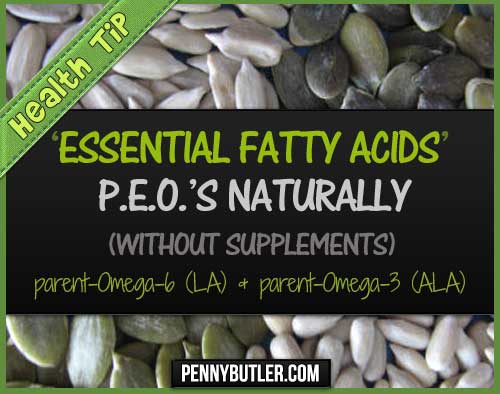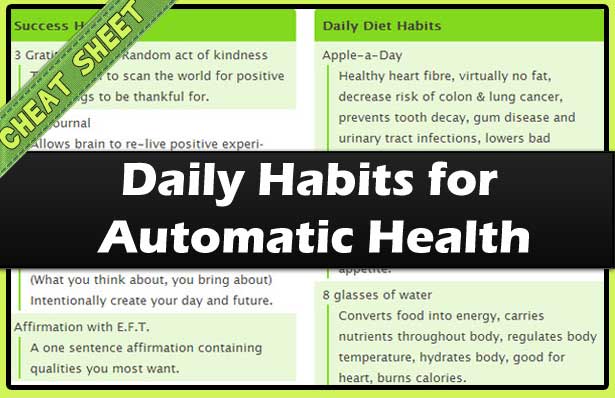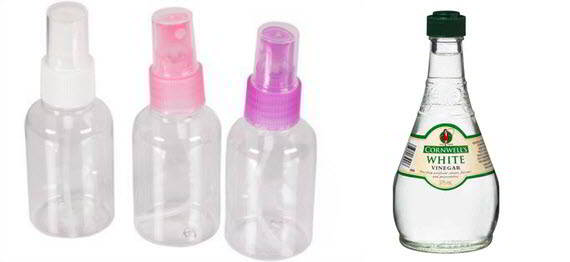How I’m adding Essential Fatty Acids (PEO: LA and ALA) naturally without taking supplements

So I’ve been trying to figure out this PEO (Parent Essential Oils) stuff that Brian Peskin is preaching here http://www.brianpeskin.com/ (01)
- Omega-6 – LA: Linoleic acid.
Your body makes into the derivatives GLA, DGLA, AA, as needed. - Omega-3 – ALA: alpha-Linolenic acid.
Your body makes into the derivatives: SDA, EPA, DHA as needed. - Proper PEO ratio: “Parent” omega-6 to “Parent” omega-3 = 1:1 to 2.5:1 (02)
Brian Peskin coined the new term ‘Parent Essential Oils‘ to differentiate the current misunderstandings of Essential Fatty Acids. The Parent Essential Oils (or PEO) refers to the only two true essential fatty acids: (03)
- parent omega-6 (LA a.k.a Linoleic acid) and,
- parent omega-3 (ALA a.k.a alpha-Linolenic acid).
From my understanding, I believe he’s trying to suggest to us to stop seeing essential fatty acids as “Omega-6” and “Omega-3” and for scientists, doctors, and nutritionists to stop getting confused with thinking that fish is a good source (just because it’s high in omega-3), but rather, for us to specifically look at the “actual” essential fatty acids contained within those fatty acids; the LA (Linoleic acid) within Omega-6, and the ALA (alpha-Linolenic acid) within Omega-3.
I read his articles and they kinda went whoosh over my head (so please if you have a better explanation – help me out in the comments!), but I believe the above is what I was supposed to understand. Then once understood, the ‘new’ thing to look for was not the ratio of Omega-6 to Omega-3, but rather the ratio of the ‘linoleic’ & ‘alpha-Linolenic’ acids.
So then I needed to try and break it down to something where I could actually implement this new LA/ALA way of looking at things.
I’m not going to try and explain his PEO research here (because I can’t) :) – instead I’ve referenced it above so you can try and figure it out too (maybe having better luck than me), and you can also listen to him explaining it on this podcast from extreme health radio (04) .
In this post, I am instead going to go into what I’m specifically doing with the information, and what specific changes to my diet I am implementing because of it.
Brian is very anti-fish oils and says they are damaging, and ‘pro’ a particular combination of essential fatty acids (1:1 to 2.5:1 of LA and ALA) but doesn’t explain ‘how’ to implement it, just the science behind it (which, while important, does make it hard for the rest of us to make heads or tails of the information to be able to correctly implement it without a science degree). Even when I listened to his interviews, the most useful heads-up to me was a link from one of the podcasts to the supplement that he specifically uses (called Yes Supplements) (05) .
As I am living below poverty level right now, a $54/mo + international postage supplement habit is not a possibility for me, plus even though I’m not totally anti-supplementation since I realize our food & soil has degraded over the years, I would rather find natural ways to ingest nutrients wherever possible which not only saves money but it just makes more sense to me.
What I gleaned from finding out that he uses ‘Yes Supplements’ is the list of ingredients:
- Organic Flax Oil
- Organic Evening Primrose Oil
- Organic High Linoleic Sunflower Oil
- Organic Pumpkin Oil
- Organic Extra Virgin Coconut Oil
Which was a great starting point to researching natural sources of LA & ALA sources.
(As always, I write these blog posts explaining what “I” am doing, and not what others should do, just to share my thought process & reasoning and to actually get your opinions and learn from you as well.)
So with this new knowledge & understanding, I’ve decided to make my own concoction of the above by adding to my diet (sparingly to my meals), the following ALA & LA -rich ingredients: (06)
Adding to my Diet:
- Flax Seed Oil or Ground Flax Seed (ALA) (07)
- Sunflower Seeds (LA)
- Pumpkin Seeds (ALA) (08)
- Walnuts (LA & ALA)
- Coconut Oil (LA)
- Fresh, Leafy Greens (LA & ALA) (09)
- Brussels Sprouts, Spinach, Parsley (ALA) (10)
- Olive Oil (11)
- Red Leaf Lettuce (12)
- Kale (13) (14)
- Avocados (LA) (15)
- Brazil Nuts (ALA & LA) (16)
- Almonds (LA) (17)
- Oatmeal in winter (ALA)
- Watercress (ALA) (18)
Could also add:
- Hempseed (LA & ALA) (19)
- Algae
- Soya Beans or Tofu (LA & ALA) (20) (21)
- Specialty Eggs* (LA & ALA) (22) (23)
- Chia Seeds (ALA) (24)
- Pistachios (LA) (25)
- Dandelion Greens (ALA) (26)
- Beet Greens (ALA) (27)
- Evening Primrose Oil (LA) (28)
- Chicken Fat* (LA) (29) *grass-fed
- Kiwifruit Seeds (ALA) (30)
- Poppy Seeds & Sesame Seeds (LA) (31)
- Mint(ALA) (32)
- Pine nuts & Pecan nuts (LA) (33)
I use coconut oil for pretty much everything – it’s my cleanser, moisturizer, toothpaste, hair conditioner, deodorant, lip balm, hair masque, etc. I use it for oil pulling and also use it whenever I cook or make uncooked slices.
Unless I’ve misunderstood the research, you only need to add a small amount of LA & ALA if you are already eating a ‘healthy’ mostly plant-based diet to improve your health, so it doesn’t seem right to me to overload my body with concentrated versions from supplements. Rather, if I add the above into foods regularly, and keep eating a healthy diet with lots of green leafy plants and stay away from “fake/processed” foods, that hopefully adding the above list sparingly to different meals is all I need to do rather than buy expensive supplements.
Dosage I’m specifically adding: (note: this is not any different to what I already do anyway, except it adds for me, another “reason why” I’m adding them to the diet.)
- a couple of teaspoons of pumpkin & sunflower seeds on a salad, or
- a teaspoon of flaxseed meal or flax seed oil in smoothies or on a salad, or
- a couple of crumbled walnuts & almond flakes on my salads, or
- coconut oil when cooking or in my slices, etc.
- kale, spinach, watercress, lettuce and other greens are already in my diet twice-daily
- I usually have either parsley OR coriander (cilantro) at any one time since I buy “for one”, so I add one or the other to my daily salads
- 1 avocado per week
It’s worth noting that I’ve already removed “bad oils” from my diet over the past year including margarine and any cooking oils, so the only oils I’ve been having are butter, coconut oil, and olive oil – all in moderation (not daily) – and I haven’t missed any of the others because I rarely need oils in my cooking because I mostly eat salads, juices, smoothies, and vegetable burgers.
I steam my vegetables if I feel like heated food or to make soups, if I stir-fry, I do it in a non-stick pan that doesn’t need oil (but if I do want oil, I use coconut oil, water, veggie-stock, or butter), and I put olive oil or coconut oil on my salad sometimes (mostly out of confusion*).
* I hope to gain some clarity one day on exactly whether I should be adding any oil at all to my salads, as there is so much conflicting advice and research, so mostly I don’t add it unless I’ve recently listened to a podcast or read an article on adding them, where I think, ‘Ok, today I’ll add it’. And every fortnight I buy fresh olives from the local fruit & veg grocer and prefer to add a few of those to my salad instead as I feel like that is a healthier and more natural choice… but this is definitely an area in my diet that I keep getting ‘confused about.
I don’t want to be someone that is so fixated on what I “think” is the truth just because I read an article, book, or research paper, when clearly the experts are still conflicted on what the truth is, and it depends on who is funding the research as to the kind of result(s) that get published.
It’s sad that after thousands of years, we still don’t have an agreement about what food we should be eating.
For me, I tend to make food decisions by thinking as if I’m an “animal” in the wild (not literally; I just consider that animals are naturally healthy in their natural environments with their natural diets).
I take into consideration what foods would’ve been naturally available that I would be instinct-fully attracted to (if we didn’t live in modern society). Then with that in mind, make choices based on what ‘doesn’t make sense’ for our natural state.
Then I keep in mind that our soil is depleted of the minerals that used to be plentiful in our food, and that animals that were once eating a natural diet with mineral-rich plants are now pumped full of antibiotics and other harmful substances, so although I’m not ready to go off-the-grid and start eating off the land, I do try and keep in mind what is ‘unnatural’ for the body and what extra things we can do to get extra-nutrition from our diets, like juicing/smoothies to get more nutrients out of our nutrient-lacking food. But I do go against that theory when I’m taking things like olive oil instead of eating olives in their natural state. We are all brainwashed, but who knows what brainwashing is correct, is it really ok for us to have hundreds of olives processed as an oil?
In a nutshell, I try and have a “reason” for everything that I put into my body, and that reason is always subject to change based on some new study, or a new opinion that makes sense to me, or by noticing the changes (negative & positive) in my health, energy-levels, happiness & general wellbeing.

Site Notifications/Chat:
- Telegram Post Updates @JourneyToABetterLife (channel)
- Telegram Chatroom @JourneyBetterLifeCHAT (say hi / share info)
- Gettr Post Updates @chesaus (like fakebook)
Videos:
References
Post navigation
Comments are closed.





![Avoid the Flu Week [Food Diary May 12]](https://pennybutler.com/wp-content/uploads/2014/04/chickpea-roti-vegsalad-avocado.jpg)
For someone who is living with such a little money it’s really a bravery to write such an article. Bravo! Your post confirms to me that money never made people more intelligent but rather more stupid herding sheeps!
Peskin also quotes a lot of studies showing that fish oil reduces the immune response; I agree with him that reducing the immune response can be a bad thing. A question that needs to be asked when something reduces immune response is this; does it just knock out the immune response, leaving the body vulnerable to cancer and microbial invaders, or does it lower the immune response by reducing the need for the immune response? An intervention could lessen the immune response by making the immune response more effective, for instance.
Very informative post. Really thank you! Awesome.